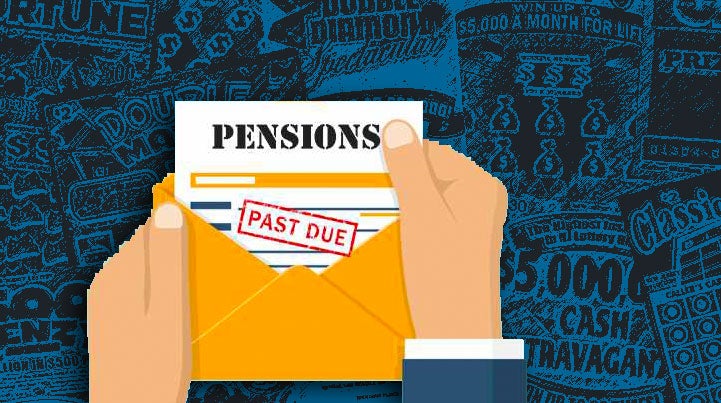Can the New Jersey Lottery save the pension fund?

Gov. Chris Christie piqued the interest of state lawmakers when he first suggested during his annual budget address several weeks ago that proceeds from the profitable New Jersey Lottery could be used to help prop up the state’s grossly underfunded public-employee pension system.
But the governor didn’t fully explain how his proposal — which would likely require the passage of new legislation — would work. Also left unclear is how the state would make up for the nearly $1 billion in lottery revenue that’s been flowing into the annual budget each year after jackpots are paid out.
Lottery dollars for pension payments
This week, lawmakers should get a much better sense of just how serious Christie, a second-term Republican in last full year in office, is about the lottery proposal. State Treasurer Ford Scudder is set to appear before both the Assembly and Senate budget committees to discuss the governor’s fiscal year 2018 spending plan with them for the first time. Scudder’s appearance before the Assembly Budget Committee is scheduled for Wednesday; he’s set to go before the Senate Budget and Appropriations Committee on Thursday.
And as lawmakers on those committees await a more thorough explanation of the lottery proposal, there’s a new sense of urgency about the deteriorating condition of the pension system thanks to another state credit-rating downgrade. Pension-funding struggles were a key issue highlighted by Moody’s Investors Service in a one-step debt-grade reduction announced last week.
Current use of lottery revenues
The first New Jersey Lottery ticket was sold in 1970, after voters the year before approved a constitutional amendment that called for the creation of a state-run lottery system. The constitutional amendment requires lottery proceeds to benefit “state institutions and state aid for education,” a broad category that has allowed the revenues to be spent in a number of ways over the years, including on psychiatric hospitals and programs for the developmentally disabled.
By all accounts, the lottery system has been a huge success, both for the state budget and those who win jackpots. The comprehensive audit of the 2016 fiscal-year state budget indicates a total of $987 million was transferred from the lottery into the budget, while $2 billion was also paid out as prizes to lottery winners. Christie’s detailed spending plan for fiscal year 2018 estimates even more revenue will come into the budget from the lottery, projecting a full $1 billion.
Pension fund needs money
At the same time, the pension system is arguably the biggest of what are several major fiscal problems that the state is facing right now. And despite Christie’s efforts to address the pension-funding issue through a major reform package enacted with bipartisan support in 2011, the system’s unfunded liability has continued to grow throughout his two terms. It now measures just under $50 billion by the state’s official calculations, and much larger according to other estimates.
The condition of the pension system — which was recently named the worst-funded state retirement plan in the country by Bloomberg — has also continuously been cited by Moody’s and other major Wall Street credit-rating agencies in a series of downgrades in recent years. Last week’s downgrade marked the fourth time that Moody’s has lowered New Jersey debt grade since Christie took office in early 2010.
In the budget speech Christie delivered before a joint session of the Legislature in late February, he said using lottery proceeds to boost the pension system could improve a paltry 49 percent funded ratio by as much as 15 percentage points.
Christie went on to say he sees lottery proceeds being used to cover pension contributions to “eligible pension plans,” a nod to the fact that the pension system actually is made up of individual retirement plans for different groups of workers, including teachers, judges, and police officers and firefighters. Some of those individual funds are in better shape than others, especially since the state has been struggling for years to cover its own employer pension contributions, as well as those for teachers, which the state has for decades been responsible for.
Making it happen
While officials from the Department of Treasury have said legislation would be needed to redirect lottery revenues to the pension system, it likely wouldn’t take much to use those revenues to support the retirement fund for teachers. The state has traditionally allowed income-tax revenue — which is constitutionally dedicated to paying for property tax relief — to be used to cover retired-teacher pension costs since every dollar the state pays means those funds don’t have to be raised through property taxes by a local school district. Legal arguments could also likely be made that the individual pension plans themselves are “state institutions.”
Not a new idea
When asked about Christie’s lottery proposal last week, Tom Byrne, the chairman of the New Jersey State Investment Council, the panel that sets policy for the pension system, pointed to an NJ Advance Media opinion piece that he recently wrote with Tom Healey, who chaired a commission of benefits experts that Christie impaneled in 2014. In fact, it was the benefits commission that first discussed the issue of lottery revenues in a report that was released in 2015.
In the opinion piece, Byrne and Healey stressed that the lottery proposal alone wouldn’t resolve the state’s significant employee pension and health-benefit funding challenges. The two men also argued that if the change is pursued seriously it should be enacted alongside other commission recommendations, including forcing workers into less costly health plans and the converting the pension system from a defined-benefits plan into a defined-contribution cash-balance retirement fund.
“It should be seen as an incentive, a very strong incentive, to deal on some of the other critical issues,” Byrne said last week.
Christie promised in the budget address that he would “look forward to sitting with all stakeholders right away to discuss the specifics of implementing this plan.” But it appears he’s yet to actually do so.
Asked last week for an update on the governor’s pension-funding proposal, state Treasury spokesman Willem Rijksen pointed back to the remarks the governor made in his budget address. Rijksen was also asked by NJ Spotlight if there was a document or policy memo available to fully explain Christie’s proposal, but nothing was provided.
This could happen before June 30
Still, Rijksen held up the lottery idea when asked about the latest Moody’s downgrade, which runs the Christie administration’s total number of downgrades to 11, counting those announced in recent years by other rating agencies like S&P Global and Fitch Ratings. Rijsken also suggested Christie wants to see lawmakers take action on the lottery issue before the current fiscal year closes at the end of June.
“The governor has long said bold action is necessary now,” Rijksen said. “He looks forward to the cooperation of the Legislature in passing legislation to allow for the lottery transfer prior to the close of fiscal 2017.”
________________________________________________________
NJ Spotlight, an independent online news service on issues critical to New Jersey, makes its in-depth reporting available to NewsWorks.
WHYY is your source for fact-based, in-depth journalism and information. As a nonprofit organization, we rely on financial support from readers like you. Please give today.




